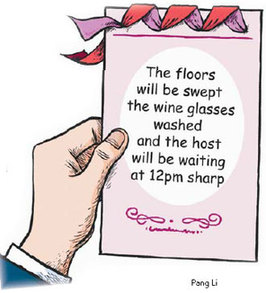 A few Chinese friends have the very annoying habit of shooting out dinner invitations at the very last minute. The phone will ring late Saturday afternoon and a super slap-up at their favorite restaurant will be announced. Normally, to my sheer horror, a boisterous session at the local KTV tends to follow.
A few Chinese friends have the very annoying habit of shooting out dinner invitations at the very last minute. The phone will ring late Saturday afternoon and a super slap-up at their favorite restaurant will be announced. Normally, to my sheer horror, a boisterous session at the local KTV tends to follow.
"Ai ya," I say. "You guys do this every time. Why can't you give me more notice, I've already got something on."
Why can't they be more impeccably organized like their great, great, great grand parents?
Up until the beginning of the last century, a dinner invitation in China was a very ordered and structured ceremony and dinner guests were given oodles of notice.
A courier would be sent to a dinner guest's home delivering a very large red envelope containing a very large red card. The color red was a symbol of festivity and celebration so the recipient knew something was cooking at Mr Wang's courtyard home.
On the flashy piece of paper, and in the finest handwriting, was an invitation to a succulent banquet. It would state that on noon on the eighth of next month "the floors would be swept, the wine cups washed and the host will be ready, awaiting their arrival".
A second invite would arrive maybe a week later and a third on the morning of the big day.
The third invitation would demand punctuality to the minute. But, guests paid no attention to the stated time and would organize their hand-carried sedan for a 4pm arrival.
A last-minute mad rush again?
By mid afternoon, a fourth and final summons may be sent urging the guest to get a move on. That's right. Mr Wang sent four hand-written messages delivered by couriers each time.
All of this rigmarole was part of dinner invitation tradition, and every guest would land on Mr Wang's doorstep four hours late.
Maybe the practice of being "fashionably late" is yet another Chinese invention.
I discovered the details about the traditional dinner invitation party, and many other wonderful Chinese old-world tit-bits, from the writings of Herbert Allen Giles, who was a British diplomat in China in the late 19th century and also professor of Chinese at Cambridge University.
"A foreigner arriving in China for the first time will be especially struck by three points to which he is not accustomed at home," Giles once said in a lecture.
"The people will consist almost of entirely of men, they will all wear their heads platted in queues, and they will all be exactly alike.
"But he will soon find out that the Chinese men are not one bit like the countrymen of his own home in the West."
Giles' stories are fascinating, but sometimes only captured the customs of a small, wealthy class of the population.
These were the practices of the Qing governing elite, who could afford to send dozens of couriers dashing across town, and in which a foreign diplomat would mostly circulate.
Today's expats can rub shoulders with everyone - from farmers and teachers to factory owners and even government officials, and everybody seems to be in a mad rush.
My spur-of-the-moment, modern-day friends were amused by the dinner invitation customs of their forefathers and have promised to give more notice.
But can they?
Without really knowing it, they are caught in the flow of a pulsating energy, which is driving China through its amazing transformation. It's all about the now.
As Master Shi Fu in Kung Fu Panda says: "Yesterday is history, tomorrow is a mystery, so that's why we call today the present."
And the Chinese are tearing off the wrapping paper as fast as they can.